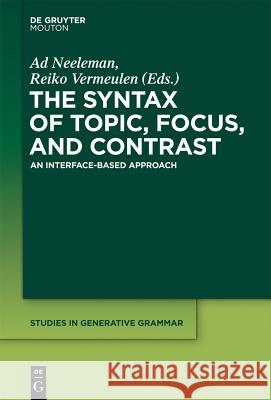The Syntax of Topic, Focus, and Contrast: An Interface-based Approach » książka
The Syntax of Topic, Focus, and Contrast: An Interface-based Approach
ISBN-13: 9781614511564 / Angielski / Twarda / 2012 / 314 str.
This book addresses how core notions of information structure (topic, focus and contrast) are expressed in syntax.The authorspropose that the syntactic effects of information structure come about as a result of mapping rules that are flexible enough to allow topics and foci to be expressed in a variety of positions, but strict enough to capture certain cross-linguistic generalisations about their distribution. In particular, the papersargue that only contrastive topics and contrastive foci undergo movement and that this is because such movement has the function of marking the scope of contrast. Several predications are derived from this proposal: such as that a focus cannot move across a topic - whether the latter is in situ or not. Syntactic and semantic evidence in support of this proposal is presented from a wide range of languages (including Dutch, English, Japanese, Korean and Russian) and theoretical consequences explored. The first chapter not only outlines its theoretical aims, but also provides an introduction to information structure. As a consequence, the book is accessible to advanced students as well as professional linguists.
This book addresses how core notions of information structure (topic, focus and contrast) are expressed in syntax.The authorspropose that the syntactic effects of information structure come about as a result of mapping rules flexible enough to allow topics and foci to be expressed in a variety of positions, but strict enough to capture certain cross-linguistic generalisations about their distribution. Syntactic and semantic evidence from a range of languages are discussed.











